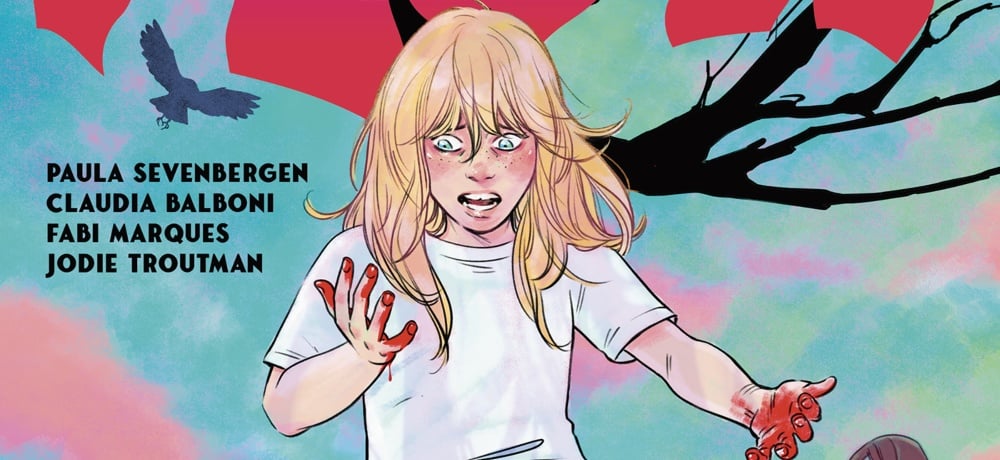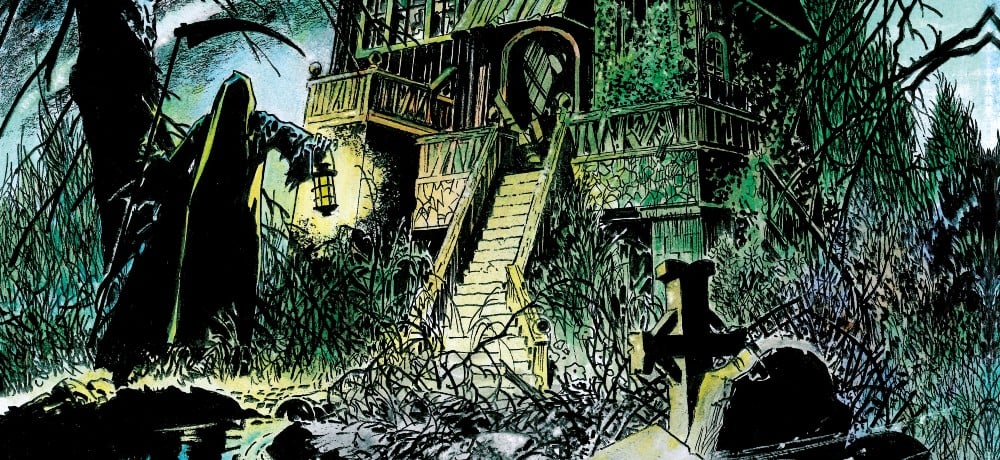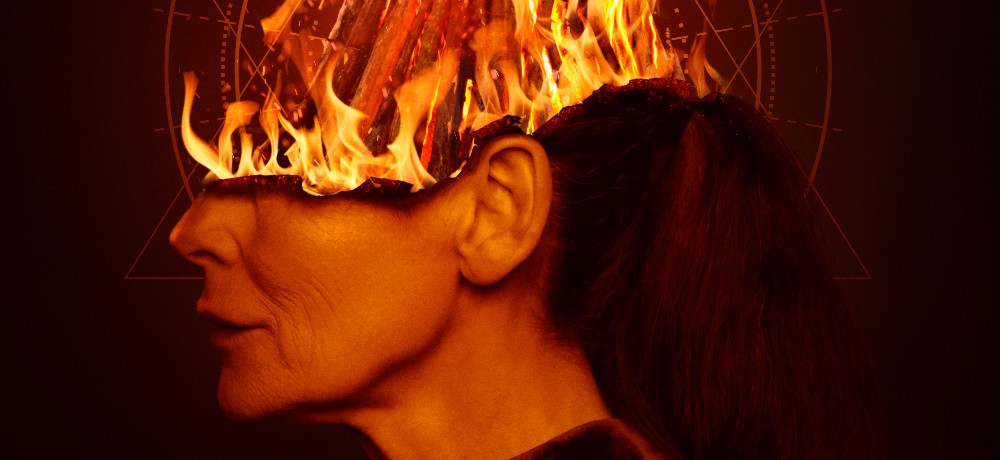






This past weekend, director Charlotte Colbert celebrated the release of her feature film debut, She Will, courtesy of IFC Midnight. Starring Alice Krige and Kota Eberhardt, She Will is centered around an older actress named Veronica (Krige) who travels to Scotland after major surgery with the help of her caregiver Desi (Eberhardt) in hopes of recuperating. But once she arrives, Veronica finds herself confronting past trauma as mysterious forces begin to overcome her, and Desi does their best to try to figure out just what exactly has a hold on Veronica and what this kind of power is truly capable of.
Recently, Daily Dead had the opportunity to speak with both Charlotte Colbert and Alice Krige about their experiences working on She Will, and during the interview, they discussed the film’s powerful story that it tells, the importance of bridging generational gaps, the bond everyone developed while working on She Will together and more.
Charlotte, if it's okay, I'd like to start with you and talk about this story that you created with Kitty and what was the genesis of this story for you both. I just thought that what you both created with the story in She Will was such an interesting way of presenting ideas of witchcraft in a way that I just don't feel like we've seen before. It was intoxicating.
Charlotte Colbert: I think Kitty had a draft that was sent to me through one of our exec producers, Ed Clark. And there were loads of themes in it that we were really interested in the history of women prosecuted for witchcraft, trauma, the way trauma blurs space and time, dreams and the unconscious, and the way we carry the muscle memory of our ancestors and things that happen before us, and potentially things to come. Yeah, so we started working on it, and I guess really bringing those elements of nature and the land and the way of representing the past that might have been potentially unusual.
Alice, for you, what was it about this project that caught your interest initially? Was it your character? Was it the script? Was it getting to work with a female director?
Alice Krige: Well, it was two things really. First of all, the script because that's what I encountered first. It's very rare to be sent to a script that has such a complex journey for a central character, but one that draws in so many themes that emerge from the character's situation and then return to it. And by that, I mean the presence of nature and the power of nature and our relationship to it. It's very easy to lose sight of in busy daily lives, and this becomes a very, very powerful process of discovery, not only for Veronica, but I think for the audience as well. There's just this sense of reconnecting with the power of the earth and the cosmos in a very unique way, and that was very present in the script.
That is just a very, very delicate development of the character's psyche or revelation of her psyche, and where she begins. And then wonderfully, Charlotte didn't want me to put myself on tape. She just asked to meet me, which is such a lovely way to start a process, because you feel that she trusts that I can act. Otherwise, I wouldn't have been sent the script, and she doesn't need to see the performance. She needed to see me, and we had a wonderful, wonderful first meeting at attenuate from my point of view. I was absolutely beguiled by her, drawn to her. I fell in love really, and it was the combination of the script in Charlotte really.
Just to piggyback off of that as well, how was it working with Kota? I just love this back and forth between the characters of Veronica and Desi in this movie, because there's a formality, but there's a real tenderness that develops between these two characters that I just really loved.
Alice Krige: Kota, I think, does a beautiful performance here. It's extremely delicate and understated, but it is all the more powerful for that. It also speaks to how good the script is because it was all there in the script. But reading the script and then finally seeing the movie because when you're in it, you're just in it. But when we saw it, when it was completed, I was so moved by this arc of the story because it is about a much, much younger woman who's been hurt in very similar ways as a child to Veronica. Veronica's reaction is to build a defensive therapist that no one can penetrate. She keeps the world at a distant arm's length with a very acerbic manner and a sense of humor. And very slowly, this young woman's compassion breaks down those defenses. That and also the power of the presence and spirit of the women who were burned, but I was incredibly touched, particularly at this time where there is so much turmoil in the world that the central heart, beating heart of this film for me is a relationship in which one person offers another with no strings attached redemption, the opportunity to trust and to consider that love is a possibility.
Something else that I enjoyed about the relationship between Veronica and Desi is the bridging of this generational gap. I feel like these days, we're seeing a lot of a generational divide between older folks and younger folks where there’s this “us versus them” mentality, and this story really breaks those barriers down. Charlotte, I was curious if that was conscientious to you and Kitty all when you were working on the script?
Charlotte Colbert: Yeah, I totally agree. I mean there's something so sad about that divide in a way and how things aren't pushed more. Actually, this really sweet girl met the other day, a 14-year-old, has a project where she goes to these amazing retirement homes and collects stories from these people, and then stages them. I thought it was such a genius thing. It should be nationwide as an educational program. It would be so wonderful. But in terms of the relationship between the characters, yeah, I think I guess in my mind, Kota's character, Desi was always another route forward as well that was perhaps non-binary and less as Alice said, outreaching. I guess she's a hopeful, heartbeat, a vertebra of the film in some ways. And I think the idea of the daughterless mother and the motherless daughter connecting was important to us.
I'm somebody who's a really big believer that whenever you do anything creative, whether you're directing, writing, acting, whatever the case may be, I believe that you obviously put a piece of yourself into the project that you're working on. But I also feel like you take a piece of it away with you as well. What has been your biggest takeaway from your experiences working on She Will?
Charlotte Colbert: It's really interesting, I was reading the other day that stories come from stories being inquiries. And I think that for me, the process of doing anything creative is an inquiry into something that either overwhelms me that I don't understand, or through the process of grappling with some form of meaning, or understanding, or resolving some stuff. In that sense, yeah, I feel both things happen. You expand something and are also able to move on in some ways. But apart from that, I also developed amazing friendships with Alice and all the people involved in front and behind the camera, who share that way of seeing the world in some ways, which is questioning reality and probing the limits of where you exist and the limits of truth. I'm very blessed with that.
Alice Krige: For me, the great, great joy of this work is the exchange that happens on the floor and around it, in the making of all the telling because you go on a journey. And it's all about the exchange and what is given to you and what you are perhaps able to give back. And sometimes, it is quite magical and it happens spontaneously, and it starts to feel like dreaming, where you go to work in the morning and you enter a dream space. It's very rare for that to happen, a true dream space. And this was one of those occasions. I take that away with me as a hugely precious experience. And of course, as Charlotte says, the friendships. The strange thing is that you all then go on to other work and you might not meet again for years. But when you do, you enter that space again as if it had never gone away.